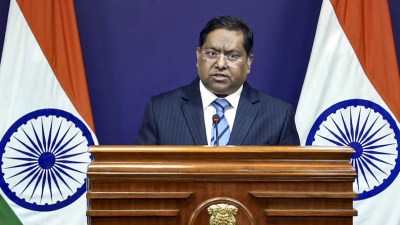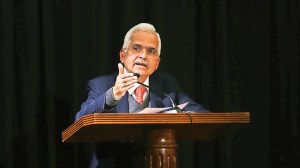The stakes are too high
Those opposing the nuclear deal are being petty. Standing firm would send an unequivocal message to India8217;s voters: that the country8217;s long-term interests cannot and must not be held hostage to political opportunists or outdated ideologues

In politics as in life, it sometimes seems no good deed goes unpunished. Indian Prime Minister Manmohan Singh has just put the finishing touches on a pact with Washington that would ratify Delhi8217;s nuclear-weapons programme and provide support for its civilian nuclear-energy programme. The deal would bring India in from the cold after decades as a nuclear pariah, confirm its status as an emerging great power and seal its ever-closer bond with Washington. It8217;s a political hat trick almost too good to be true, and pundits in the United States are already complaining that the deal gives India everything it wants while asking little in return. Yet what has been Singh8217;s reward? He now faces the worst political crisis of his career. His government could collapse in the coming week 8212; just when it should be celebrating a crowning accomplishment.
That8217;s thanks to two powerful spoilers on the Indian scene. One is the opposition Hindu nationalist Bharatiya Janata Party, whose ally, the former defence minister, George Fernandes, declared in Parliament a few weeks ago that were Singh a Chinese politician, his actions would have gotten him executed. The other are India8217;s two main communist parties, members of Singh8217;s own coalition, who have threatened to bolt from the government if the deal goes through. The Left and the Right share a similar complaint: that the pact would undermine India8217;s 8220;strategic autonomy8221; by forcing it to align too closely with Washington. But such rhetoric overlooks the overwhelming benefits of the deal, and the opposition more likely owes to political opportunism and outdated Indian anti-Americanism. While the sources may be petty, however, the threat is very real: India, finally poised to step into the sun, may be about to flub its big chance. The costs of failure would be profound for US-India relations, Delhi8217;s international credibility and its hopes of achieving great-power status.
It8217;s no small irony that opposition to the deal has brought together the communists and the right-wing Hindu nationalists. Both are profoundly disingenuous. After all, it was the BJP, when in power from 1998 to 2004, that brought Washington and Delhi so close together. The BJP8217;s current opposition can thus be explained only by base motives: its leaders are bitter at the thought that Congress will get credit for their groundwork, and they sense an opportunity to bring down their enemies.
The communists, meanwhile, look equally opportunistic, and their claims of Indian nationalism ring hollow. Though they claim the accord would make India subservient to the United States, they had no problem when India showed great favouritism toward the Soviet line through much of the cold war. More fundamentally, it is impossible to honestly believe that the deal will in any way compromise India8217;s independence. The accord would make India a recognised member of the nuclear club 8212; a closed circle of nations circumscribed by the Nuclear Non-Proliferation Treaty NPT, which India has refused to sign. Moreover, after long neglect from Washington, it would confirm India8217;s new status as a global player. Such standing has long been the dream of India8217;s policymakers; achieving it would enhance, not limit, India8217;s strategic autonomy.
Then there are the nuts and bolts of the deal itself. India8217;s refusal to sign the NPT, starting in the 1960s, and its subsequent nuclear tests exposed it to a raft of international sanctions, denying it access to nuclear fuel and critical technology. Such restrictions hobbled the country8217;s civilian nuclear-power industry. The new deal would reverse all this, affording India the same benefits as NPT membership, including access to critical technology and fuel. Once blessed by the International Atomic Energy Agency IAEA and the Nuclear Suppliers Group, the deal would finally unshackle India8217;s high-tech and civilian nuclear industries. The communists have no grounds for opposing such a turn, which would help address India8217;s acute energy shortage and improve the lives of its citizens. Yet that has not stopped the communists from trying to scotch the deal.
It remains unclear whether they will succeed. Three scenarios seem likely. First, the communists could make good on their threat to leave the government and to try to bring it down. With 62 seats in Parliament, they have the numbers. But such an outcome remains unlikely, since voting against the Congress-led government would mean voting with the chauvinist BJP, whom the communists loathe even more than the United States.
Second, the communists could strike a deal with Singh, ensuring their continued support in exchange for a larger role in India8217;s foreign and security policy. In practical terms, that would likely mean limiting US-India defence cooperation, resuscitating India8217;s espousal of Third World solidarity, and cozying up to anti-American regimes. Though slightly more plausible, this scenario is also unlikely. India can8217;t afford to revive the precepts of nonalignment. The country needs investment from advanced industrial states, collaborative ventures and access to their markets. Outdated rhetoric could prevent such goods, leading India to be marginalised once more.
The most likely outcome, therefore, is that Singh will stand firm. He has already publicly called the communists8217; bluff, daring them to bolt. If he continues to ignore their threats and the baying of the BJP while forging ahead with the deal, it will strengthen his hand by making him seem tough and able to deliver. Even if the communists do then succeed in bringing his government down, it could play in Congress8217;s favour. After all, the communists garnered barely 5 per cent of the vote in the last national election, and due to some clumsy recent maneuvering, would likely attract even less support now. And voters who abandoned the communists would never turn to the BJP. This means new elections would likely increase Congress8217;s power.
Standing firm would send an unequivocal message to India8217;s voters: that the country8217;s long-term interests cannot and must not be held hostage to political opportunists or outdated ideologues. That is a position most Indians seem likely to respond to. Despite the threats, therefore, it8217;s too soon to count out Singh or the nuclear deal. The stakes, for India and the United States, are just too high 8212; and that is something Indian voters will hopefully recognise.
The writer holds the Rabindranath Tagore Chair in Indian Cultures and Civilisations at Indiana University
Newsweek
- 01
- 02
- 03
- 04
- 05































